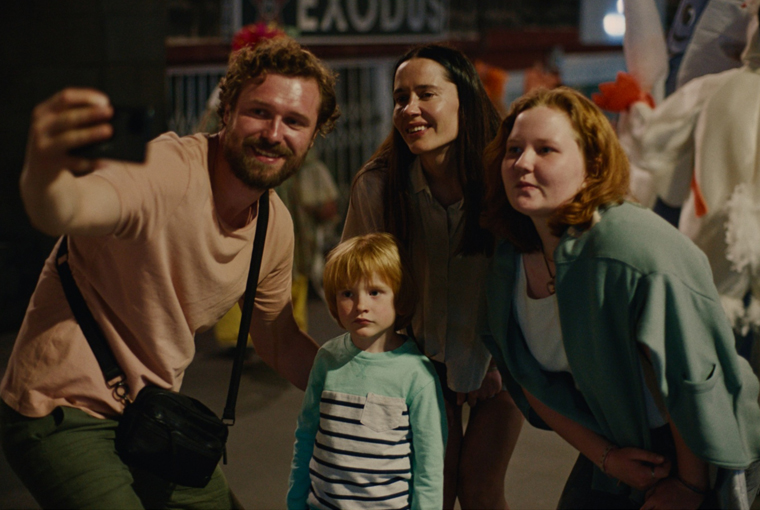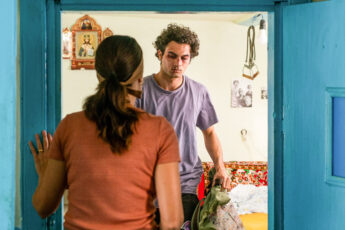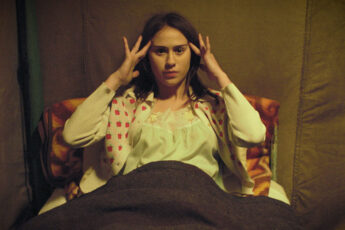“How Long Are You Going to Stay?”
Damian Kocur’s Under the Volcano (Pod wulkanem, 2024)
Vol. 145 (May 2024) by Jack Page
While vacationing in the Canary Islands, a Ukrainian family are left homeless at the news that Russia has invaded their country. As tensions build amongst the family and other foreigners in the hotel, the parents attempt a life of forced normalcy by extending their excursions. However, sightseeing only offers a temporary relief from the frustration and inability to communicate with their loved ones back in Kyiv. Eventually, the family decide to have one last celebratory outing together before the father leaves for Poland to join the Ukrainian armed forces.
At first glance, Under the Volcano plays like any other unassuming family drama. But under its surface, the film engages with problematic notions of xenophobia and the insidious nature of discrimination born out of one’s own suffering. Once the family hear the news of Russia’s invasion of Ukraine and their return to Kyiv is at a standstill, the stranded individuals are given unlimited room and board at a neighboring hotel. After a number of encounters with some Russian guests who appear to be enjoying themselves a little too much, the mother Nastia (Anastasiia Karpienko) snaps at the breakfast table, berating them for their lack of compassion and ignorance. She is eventually silenced by the other diners, who complain that her outburst is rude and uncalled for. Similarly, while parking the car, the father Roman (Roman Lutskyi) confronts a British tourist who blocks his parking space. The tattooed English thug quickly approaches the family’s car, physically assaulting the driver’s window. In both scenes, the antagonistic attitude that the parents have adopted as a result of their current situation, leads to unnecessary arguments and altercations. The invasion of their home country has made them paranoid of other cultures and aggressively protective of their family.
One conclusion is that these sequences act as a warning sign to the spectator, to not allow the wrongdoings of some people inform our assumptions of all people. In both cases, such thought processes lead to wrongly preconceived notions of cultures and races, even to misplaced hatred. The film also includes a variety of altruistic and ethnically diverse characters that intend to support the family during their stay. Apart from the generosity of the hotel management, teenage daughter Sofia (Sofiia Berezovska) befriends a group of young girls at the beach who attempt to bond with the awkward teenager with pole dancing, cliff jumping, and gossip. Sofia’s closest friend though, is an irregular immigrant who sells trinkets to the tourists at lunch time. Putting Sofia’s own predicament in perspective, he shares his own traumatic journey to the country, where he lost his best friend after the migrant boat began to sink near the beach. It is a complicated view of both just and unjust prejudice that the family must navigate. This brewing political and ethical storm within the minds of the characters is smartly manifested in the recurring motif of the ocean’s waves, which proliferate until they erupt tumultuously against one another with unstoppable force.
Set entirely within the touristic hotspots of Tenerife, the exotic exterior sequences of the film offset the clinical interior shots of the family’s vacation that is brimming with gloomy hotel rooms, empty lobbies, busy breakfast buffet tables, and lengthy, cramped car trips. However, two exterior scenes in particular evoke imagery that lifts the family from the confines of their holiday setting and displaces them into an alternative scenario that mirrors the documented war zone of Ukraine. The first instance is during their hike to a local volcanic site. The family slowly emerges from a foggy background towards the camera. The soft focus of the shot blurs the immediate surroundings. A layer of dust hangs above the dirt road and the broken branches of the sparse forest swallow the four figures. As they approach the camera, their gait is dwindling. They kick rocks out of their path, breathless from the physical exhaustion of the uphill struggle. They are overdressed in hiking gear, particularly for the location’s climate. The overexposure from the natural sunlight enhances the scene’s grey, somber aesthetic. As their father’s mobile phone battery dwindles, the son cries with tiredness. The panic-stricken parents bicker as they fail to find phone signal and admit how unprepared they are for the hike. Lost in the wilderness, this moment draws parallels with the fearful journey of the desperate Ukrainian refugees forced to flee their home country. Clad only with the essentials and any personal belongings they are strong enough to carry, the family mimics the thousands of real-life citizens who are made to brave the unknown in order to escape the invasion.
The other sequence is at the very end of the film, where the family spends one last night out together before the father leaves to enlist in the army. After a final, bittersweet family portrait photo, the daughter Sofia wanders off on her own. Fireworks illuminate the sky with thunderous bangs as the locals run into the street celebrations with flares and neon lights. As the roaring of the partygoers and the frequency of the fireworks builds, Sofia covers her ears with her hands. Cupping her head, her look of wonder at the colorful display falls into a painful grimace. Strolling down a now empty street, she weeps as the ceaseless flashes of light and audible eruptions bombard her senses. The allure of the festival’s spectacle is soon undermined by the imagery it alludes to: a city in the midst of an occupation. The hot, white flashes and loud blasts of the fireworks display are reminiscent of the explosions of artillery fire. The smoke that emanates from the sky showers the deserted street, as if abandoned by the public. The shrill cries of pleasure from the partygoers are quickly associated with the painful wailing of the innocent bystanders whose doorsteps have been turned into a war zone.
Importantly, this reading of the film is just one perspective, wherein the tragic imagery of the well-documented war in Ukraine is keenly reimagined within the confines of the Spanish setting. It may not be the filmmaker’s intention, but mere coincidence, yet the response these scenes ignited in my personal experience is illustrative of the ubiquitous nature of the war for the family, regardless of their distance and separation from their country. Even the news reports are a constant reminder for the family, as they helplessly witness the invasion unfold on their phones or through TV screens and radios in a foreign language, further amplifying their incomprehension of the situation.



Leave a Comment